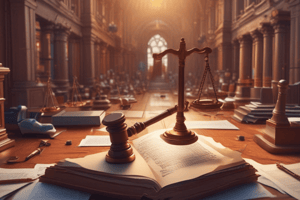Podcast
Questions and Answers
What does a motion to quash seek to achieve?
What does a motion to quash seek to achieve?
- To conduct an arraignment
- To declare a specific legal proceeding invalid (correct)
- To present evidence in court
- To initiate a court proceeding
Which of the following statements about a plea is correct?
Which of the following statements about a plea is correct?
- The plea can only be made in writing.
- A conditional plea can be made under certain circumstances. (correct)
- A plea is always considered guilty.
- An accused can plead guilty without being present.
What must happen during the arraignment process?
What must happen during the arraignment process?
- Judgment is given immediately after the plea.
- The accusations must be read in a language unknown to the accused.
- The accused must enter their plea personally. (correct)
- The accused can plead without being present.
What does the court proceeding involve?
What does the court proceeding involve?
When might a plea not be considered guilty?
When might a plea not be considered guilty?
What is the time frame within which the trial must be held after the arraignment?
What is the time frame within which the trial must be held after the arraignment?
Which component is NOT part of the pre-trial process?
Which component is NOT part of the pre-trial process?
How many days does the accused have to prepare for trial?
How many days does the accused have to prepare for trial?
What occurs following the presentation of evidence in a trial?
What occurs following the presentation of evidence in a trial?
In the case of an acquittal, what must the prosecution prove?
In the case of an acquittal, what must the prosecution prove?
What happens if the accused admits the act but has a lawful defense?
What happens if the accused admits the act but has a lawful defense?
What must a judgment be written in?
What must a judgment be written in?
What is the final step that occurs after adjudication of guilt or innocence?
What is the final step that occurs after adjudication of guilt or innocence?
Flashcards
Court Proceeding
Court Proceeding
A legal process in court to hear and decide cases, including evidence, testimony, and a guilty/not guilty judgment.
Arraignment
Arraignment
Formal reading of charges to the accused, requiring a plea of guilty or not guilty.
Plea
Plea
A formal response by the accused, stating guilty or not guilty.
Not a Guilty Plea
Not a Guilty Plea
Signup and view all the flashcards
Motion to Quash
Motion to Quash
Signup and view all the flashcards
Plea Bargaining
Plea Bargaining
Signup and view all the flashcards
Pre-Trial Motions
Pre-Trial Motions
Signup and view all the flashcards
Trial Presentations
Trial Presentations
Signup and view all the flashcards
Direct/Cross/Re-Direct/Re-Cross Examination
Direct/Cross/Re-Direct/Re-Cross Examination
Signup and view all the flashcards
Finding of Guilt
Finding of Guilt
Signup and view all the flashcards
Finding of Innocence
Finding of Innocence
Signup and view all the flashcards
Judgment (Conviction/Acquittal)
Judgment (Conviction/Acquittal)
Signup and view all the flashcards
Judgment Finality
Judgment Finality
Signup and view all the flashcards
Study Notes
Court Proceedings Overview
- Court proceedings are a legal process where cases are publicly heard and decided.
- Evidence, testimonies, and documents are presented to determine guilt or innocence.
Stages of Court Proceedings
-
Arraignment and Plea (C-R-A):
- Formal reading of accusations against the accused.
- Accused is given a copy of the charges and asked to plead guilty or not guilty.
- Must be in open court.
- Accused must be present and plead personally.
-
Pre-Trial (P-S-M-W-M-M):
- Held within 30 days of arraignment.
- Plea bargaining, stipulation of facts, evidence identification, and objections to admissibility are discussed.
- Modification of the trial order occurs if changes are needed.
- Agreed-upon matters are discussed and confirmed.
- Accused has 15 days to prepare for trial.
-
Trial (P-D):
- Held within 30 days of the pre-trial.
- Both prosecution and defense present their evidence.
- Direct, cross, redirect, and recross examinations take place.
- The accused has 15 days to prepare for the trial.
-
Judgment (T):
- Decision by the court determining guilt or innocence.
- Penalty and civil liability are imposed, if applicable.
- The verdict is written in official language and signed by the judge.
- It clearly states the facts and the law upon which the decision is based.
-
Convictions and Acquittal
- Conviction: Specifies the offense, aggravating/mitigating circumstances, the accused's participation, penalty, and civil liability.
- Acquittal: Indicates that the evidence presented did not sufficiently prove guilt.
-
Appeal:
- Review of court decisions by higher courts.
- Cases decided by the Court of Appeals (CA) can appeal to the Supreme Court (SC), and Regional Trial Courts (RTC) can appeal to the CA.
-
When are judgments final?
- If the accused waives the right to appeal.
- If the accused applies for probation.
- After the lapse of 15 days following the decision is handed down.
-
New Trial/Motion for Reconsideration (MFR):
- New trial requested based on errors of law, irregularities impacting the accused's rights, new evidence discovered, or new proceedings.
- MFR requested based on errors of law or irregularities in the judgement, and there is no need for another proceeding.
- Specific number of days for appealing a judgement can be suspended.
Studying That Suits You
Use AI to generate personalized quizzes and flashcards to suit your learning preferences.




